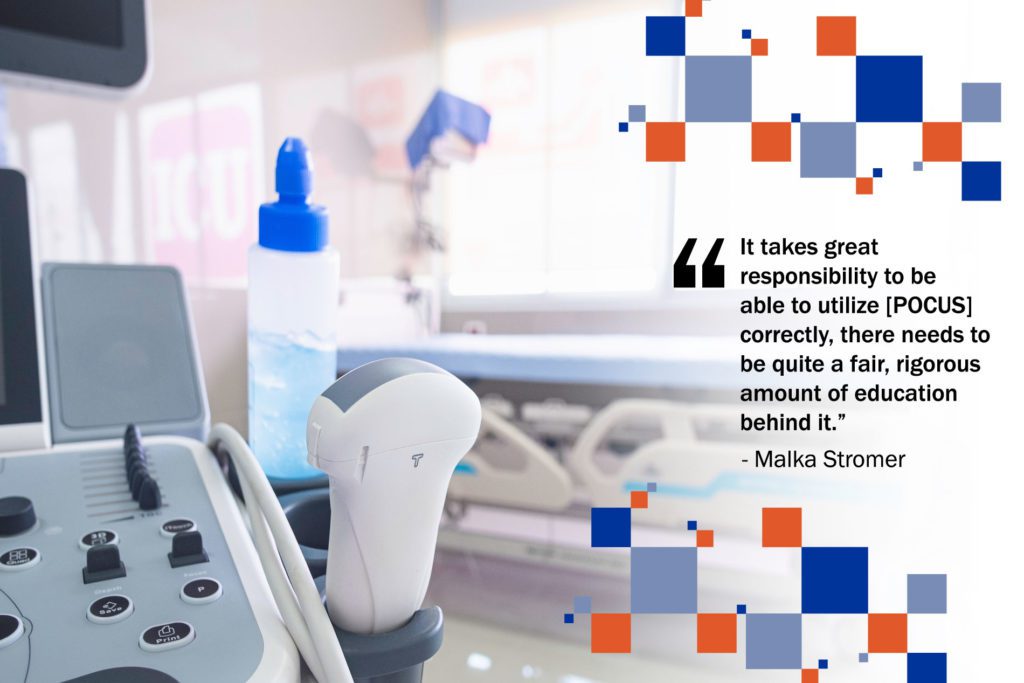Point-of-care ultrasound (POCUS) provides better care from a technical and a patient standpoint.
It’s cost-effective, transportable, and able to supplement diagnoses by providing valuable information that allows doctors to make more informed decisions. The practical advantages of the device also improve what’s at the heart of medicine—patient care.

When featured on the POCUS Certification Academy™ podcast episode, Interdisciplinary Practices in Medical Schools with Ultrasound Curriculum, owner of Sound Sports Imaging, LLC, Malka Stromer focused on the importance of integrating POCUS into healthcare curriculums. While she referred to it as a “great triage tool” for health practitioners across different fields, Stromer stressed how a lack of training creates a barrier to its use.
“It takes great responsibility to be able to utilize it correctly, there needs to be quite a fair, rigorous amount of education behind it,” said Stromer when discussing the importance of increasing the accessibility of POCUS training.
As POCUS is growing in impact, medical programs are working to ensure their graduates are knowledgeable of, and proficient in, the tool that is taking the healthcare world by storm.
Incorporating POCUS Into Healthcare Education
While medical programs are continually working to adapt their curricula to incorporate POCUS, they recognize barriers that need to be addressed.
Given the rapid growth and changes surrounding the use of POCUS, and the advancements of the technology, maintaining an up-to-date program can be taxing on a school’s resources. Sharing his experience from leading the efforts to ensure McGill University’s medical students graduated with POCUS expertise, Dr. Peter Steinmetz has seven tips that he recommends universities follow. These steps help to overcome hurdles and provide the ability to support an ultrasound curriculum in a four-year undergraduate program.
- Explain how early POCUS training provides more comprehensive clinical results
- Prove that teaching POCUS does not increase the training load
- Develop the right infrastructure for program viability
- Have enough budget to hire qualified POCUS instructors and staff
- Be ready to back up your POCUS initiatives with hard data
- Focus on using POCUS to enhance students’ clinical skills
- Continually look for ways to improve POCUS training
Why Include POCUS in the Curriculum
The field of medicine is changing, and students must be educated in the most recent trends and technology. Dr. Davinder Ramsingh argues that it’s time to update the stethoscope and asserts that POCUS could play a monumental role in improving the physical exam.
Additionally, incorporating POCUS into the curriculum benefits students and increases their confidence levels.
A 2017 study conducted at Loma Linda University found that medical student-performed (SP) point-of-care scans in the emergency department can lead to accurate diagnoses and impact patient management. The authors of the study wrote that “the implementation of SP-POCUS could serve as an ideal method of developing ultrasound skills in medical school while positively impacting patient care.”
POCUS Opportunities Outside of the Classroom
As universities and programs are working to integrate POCUS into their courses, there are numerous opportunities for professionals and students alike to engage with POCUS outside of the classroom. There are various research, learning materials, workshops, and certification programs available for people interested in learning POCUS.
Loma Linda University Medical Center, UCI Medical Center, UCLA Medical Center, and other medical programs have partnered to address the need for more accessible training and education on POCUS. They published one of their initiatives, the F.O.R.E.S.I.G.H.T. (Focused perioperative Risk Evaluation Sonography Involving Gastro abdominal Hemodynamic and Transthoracic ultrasound) curriculum — a successful strategy for POCUS education that is free online.
The POCUS Certification Academy™ provides online learning resources to share knowledge with healthcare providers and enhance global health through POCUS. Furthermore, provided is a broad range of opportunities for professionals to become certified in POCUS.
The Expansion of POCUS
POCUS education is rapidly expanding. From being incorporated into the traditional classroom to having resources and opportunities becoming obtainable online, better experience with POCUS will lead to better care in the medical field.
Ready to get started on your POCUS journey? Check out our many certificates and certifications here.
Looking for additional inspiration? Sign up for our POCUS Post™ newsletter to receive monthly tips and ideas.
























